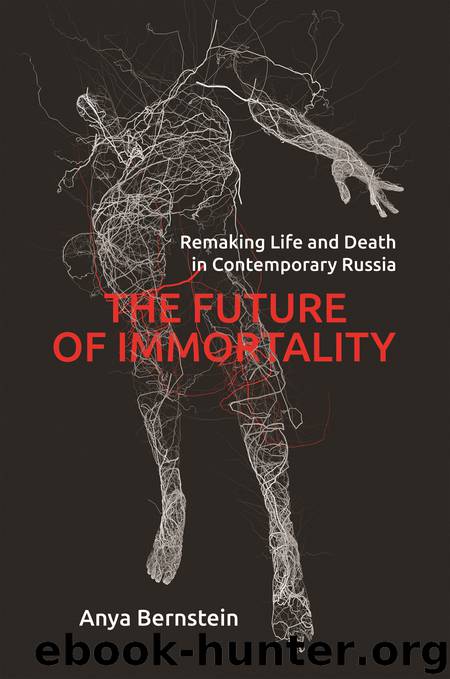The Future of Immortality by Bernstein Anya;

Author:Bernstein, Anya;
Language: eng
Format: epub
Publisher: Princeton University Press
Published: 2019-03-19T16:00:00+00:00
Figure 3.4. V. P. Skulachev at his office at MGU. The speech bubble on the photo with the naked mole rat says: “You are so old!” Moscow, December 2015. Photos by the author.
Gacheva went on to recall some of Mechnikoff’s key claims in his Etiudy optimizma (Optimistic essays), adding that before his death he found himself waiting for his own death instinct to kick in. But it didn’t come. He desperately wanted to go on living.
During the last three years of his life (1913–16), Mechnikoff, ever the scientist, made himself the subject of his own experiments. In particular, he wanted to test his theory about the “death instinct” coming on as one approached the end. The medicophilosophical diary he kept during these years is a curious blend of meticulous observations of specific processes taking place in Mechnikoff’s ailing body correlated with the extremely mixed emotions he was having about death. Although his statements often contradict each other, I would paraphrase Gacheva’s take. Rather than desperately wanting to continue living, I would say Mechnikoff was desperately waiting for the death instinct to arrive. Two months before his death, on his seventy-first birthday, Mechnikoff wrote: “I cannot say for sure what I feel. On the one hand, I would like to get better, but on the other, I don’t see the point in going on living. My illness didn’t cause me to fear death, but I am lacking the sense of enjoying life.” He proceeded to say that if he did have any desire to get better, it was for “practical reasons”: his finances had been seriously affected by the war, and he worried whether his wife would be able to continue to live comfortably after his passing (Mechnikoff 1946, 178).
“Just like Mechnikoff,” Gacheva continued her reflections,
Skulachev is flirting a bit with our contemporary world, the world which accepts finitude. In this world, death is natural [estestvenna]. For all our disagreements with the transhumanists, what we [Fedorovians] consider their strongest suit is that death for them is anti-natural. Fedorov and the Cosmists thought the same. This, of course, involves a certain defiance, a challenge [vyzov]. On the one hand, it is a challenge to our image of the world and of the human. On the other, their attitude demonstrated that the immortal human is something like a natural result of further evolution. Recall that the Cosmists had this idea of active evolution, the idea of ascending development [voskhodiashchee razvitie]: the further development of the spirit and of consciousness inside matter [v lone materii], where matter is what has to be overcome and transformed.
The key idea for the Cosmists, as Gacheva went on to point out, is the “anti-entropic” nature of life, of labor, and of creativity. For them, death is entropy, and from this comes the idea of the human as a warrior figure, fighting against chaos, against entropy, and against death. Fedorov and the Cosmists envisioned the overcoming of death as the primary ontological and existential (bytiinaia) task to be performed by humanity.
Download
This site does not store any files on its server. We only index and link to content provided by other sites. Please contact the content providers to delete copyright contents if any and email us, we'll remove relevant links or contents immediately.
The remains of the day by Kazuo Ishiguro(7601)
Tools of Titans by Timothy Ferriss(7003)
The Black Swan by Nassim Nicholas Taleb(6237)
Giovanni's Room by James Baldwin(5938)
Inner Engineering: A Yogi's Guide to Joy by Sadhguru(5931)
The Way of Zen by Alan W. Watts(5829)
The Six Wives Of Henry VIII (WOMEN IN HISTORY) by Fraser Antonia(4815)
The Power of Now: A Guide to Spiritual Enlightenment by Eckhart Tolle(4795)
Astrophysics for People in a Hurry by Neil DeGrasse Tyson(4641)
Asking the Right Questions: A Guide to Critical Thinking by M. Neil Browne & Stuart M. Keeley(4627)
12 Rules for Life by Jordan B. Peterson(3780)
The Ethical Slut by Janet W. Hardy(3534)
Skin in the Game by Nassim Nicholas Taleb(3503)
Housekeeping by Marilynne Robinson(3443)
The Art of Happiness by The Dalai Lama(3409)
Double Down (Diary of a Wimpy Kid Book 11) by Jeff Kinney(3302)
Skin in the Game: Hidden Asymmetries in Daily Life by Nassim Nicholas Taleb(3290)
Walking by Henry David Thoreau(3250)
12 Rules for Life: An Antidote to Chaos by Jordan B. Peterson(3215)
